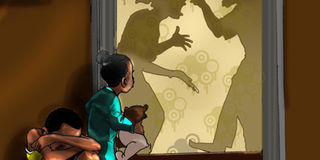When parents fight, children suffer

My earliest memory of a couple fighting was one where our neighbour then in the mid 90s, threw bottles at his equally aggressive wife. I was about six years old. I learnt that it is not always a smooth ride in every home, or marriage like it seemed with my parents. However, the fight between our neighbour and his wife causing their two and four year old children to cry in confusion did not contaminate my perception of my parents.
I still grew up never imagining my parents argue or fight. Apart from hearing stories of occasional arguments here and there from mother, as far as I am concerned in my childhood memories, my parents are clean of fights. It is on this concept that I base my conviction of marriage upon; that my marriage will be clean too at least in the eyes of my offspring.
Traditionally, during weddings couples were always advised to settle their conflicts from the village well. “Once you have an argument that leads to a fight, as a couple, go to the well and fight. Thereafter, bathe and come back home smiling,” said one of the couple’s uncle at a wedding reception.
This is probably because most wells in villages are in valleys out of sight of the children and neighbours. The proposal to protect children from seeing their parents in conflict is to prevent sowing violence, sadness and confusion in their unstained minds.
Prossy Nabagereka a child counsellor with Mildmay Uganda says children witnessing their parents fight or argue not only makes them sad but also confused on whose side to take. Pamela Nankanja a mother of two explains, “Children usually develop a negative attitude towards the parent who is most aggressive.”
According to Nabagereka, children who watch their parents fight also get traumatised and sets the wrong example of being violent to others even to those they love. The concern, stress, confusion and depression that children experience from witnessing their parents in conflicts usually ends in poor performance in their academics and loss of interest in things they loved to do.
Nankanja says, “Even when I am angry, my children usually ask my husband, ‘Daddy what is wrong with mummy.’ If we fought in front of them, they would be distraught with anxiety and confusion.”
She further narrates, “One day my children came and said, ‘Mummy mummy Louisa’s dad is beating Louisa’s mother and she is crying. It was the neighbour beating his wife to leave but my children were petrified.”
Children react different to these violent moments between their parents. Some children are drenched with fear, others are left sad and confused not understanding what the matter is with their parents while some children enjoy watching their parents fight.
“Some children who will tell their friends, ‘I want to go home and see mummy beating daddy,” Nankanja says. Such children usually enjoy seeing their least favourite parent victimised because the parent disciplines them as well. Apart from children developing shame and low self-esteem among their age mates, they also develop bad behaviours because the parents, whom they trust, give them the perception that it is good to fight.
Some of the long-term effects Nabagereka says result from children seeing their parents in disagreement is post-traumatic disorders like fear of commitment in relationships and marriage. She adds, “A man who witnessed his father fight his mother might have the conviction that women are difficult to relate with while a woman might perceive that men are disrespectful.” Due to this lack of respect for their spouses, men and women are easily prone to infidelity in their relationships.
If fighting in front of children results in irreversible damages to them, what then is the best way for parents to solve conflicts between themselves? “When I am in conflict with my husband, we meet in a place away from home like a restaurant or hotel and resolve our issues,” states Nankanja.
She further says, couples can even just meet under a tree to talk about their issues and go home happy to hug their children.




